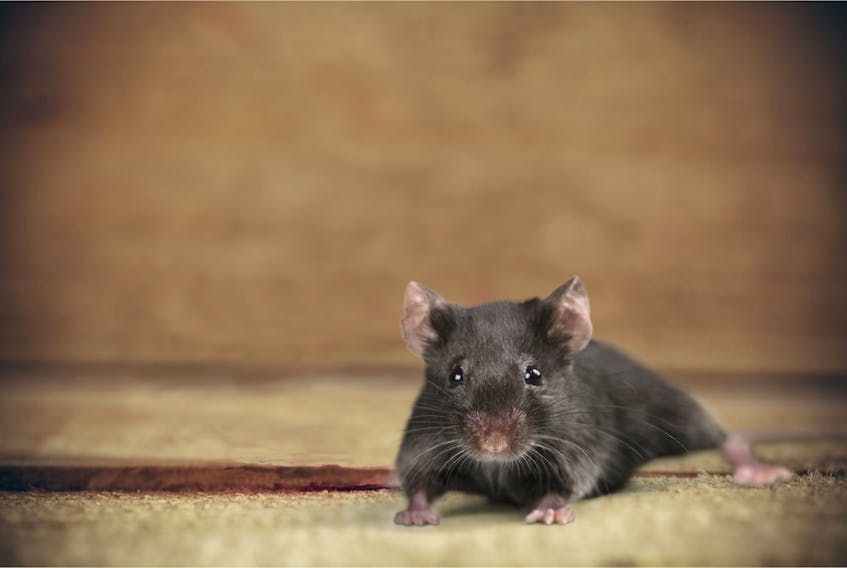When K and C Pest Control began operations around 20 years ago, business would slow to nearly a halt in November.
Summer, when creepy crawly insects or wasp nests were the big problem, was the busiest time.
Related stories:
Corner Brook’s Doug Barter believes roaming cats can help keep rodents away from homes
While the late fall and winter is when rodents start to try to find warmer spaces to call home, the company would maybe get one call a week from someone with a rodent problem.
The times have certainly changed in the Corner Brook area, according to Chris Crocker.
“We have been getting a call or two a day for the last year or year and a half,” the owner of the Corner Brook-based pest control company said of the growing frequency of calls to deal with rat or mice infestations.
That mirrors the City of Corner Brook’s take on the issue. The municipality says rats have become a bigger problem in the last couple of years and there doesn’t seem to be any reprieve in sight.
“I’ve talked to others in the business about this problem and some think it might be because of the milder winters or because there are no real natural predators for rats,” said Crocker.
In Tuesday’s edition of The Western Star, Corner Brook resident Doug Barter advocated for being permitted to allow pet cats to roam neighbourhoods as a way to help control the rising number of rats in the city. Barter said only cats that have been spayed or neutered, have updated vaccinations and have microchips so they can be quickly returned to their owners, should be permitted to wander freely, if their owners want them to.
Acknowledging rats can do a lot of damage if they get inside a home, Crocker doesn’t think permitting roaming cats is a good policy to develop and not just because it might cut into his line of business.
“I wouldn’t recommend that because rats can carry diseases and parasites that could be brought back into a home by a cat,” he said. “A big rat could also fight back and injure a pet, so that is not something I would support.”
Barter, who said he had noticed more rats and mice around his home after keeping his cat inside since being fined for letting it roam in August, caught a large rat in a trap he set behind his house Sunday.
Crocker thinks snap traps that kill rodents are fine in a safe indoor setting, but could pose a hazard for other animals or even kids who might find a baited trap interesting.
“A snap trap could break a dog’s paw,” he noted.
While the services of a professional are usually required for home infestations, Crocker suggested using live traps for trying to catch rodents outside before they get a chance to move in and start reproducing.
Some tips on preventing rodent infestations
Rodent-proof your home
The first line of defence is to get rid of easy entry points. Mice can squeeze through cracks as small as a dime, while rats can enter through a quarter-sized hole. Even the small gaps created by worn thresholds under doors will allow mice access to your home.
- Use metal weather stripping under doors, and weather strip windows.
- Patch cracks in foundations.
- Stuff steel wool around pipes before caulking or plastering.
- Cover dryer vents, attic vents, and soffits with fine mesh metal screening.
Make your home less appealing to rodents
- Remove cosy nesting sites in unused clutter around your house and garage.
- Cut tall grass and weeds back from your house.
- Secure garbage in containers with tight-fitting lids.
- Raise woodpiles about 30 centimetres (1 foot) off the ground. Place them away from your house.
- Never place fatty or oily food waste, eggs, or milk products in the composter.
- Use a layer of heavy metal mesh between the soil and the bottom of the composter.
- Eliminate water sources (like leaky taps, sweating pipes, and open drains).
- Keep your kitchen clean. Store dry food and dry pet food in metal or glass containers.
Physical control options
- Traps (live for outside, kill traps for areas not accessible to kids or other animals)
- Ultrasonic devices that repel rodents, though rodents can become accustomed to these.
Products
- Baits or poisons should not be used as the only method to control rats and mice. Other management strategies such as rat and mouse-proofing and good sanitation must be used to achieve satisfactory control of rats and mice. Such products should only be used in areas not accessible to children or pets.
Source: Health Canada









